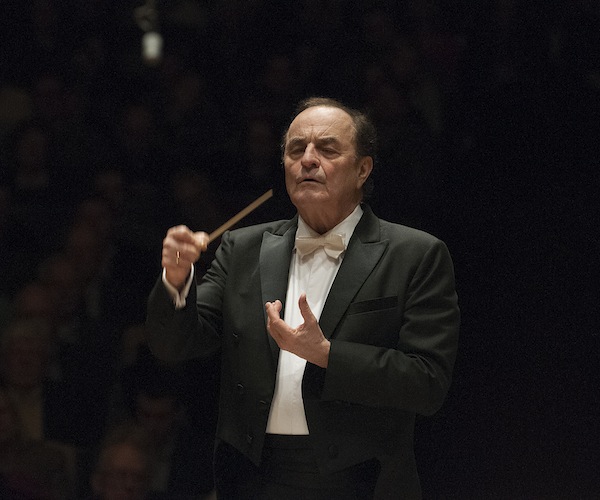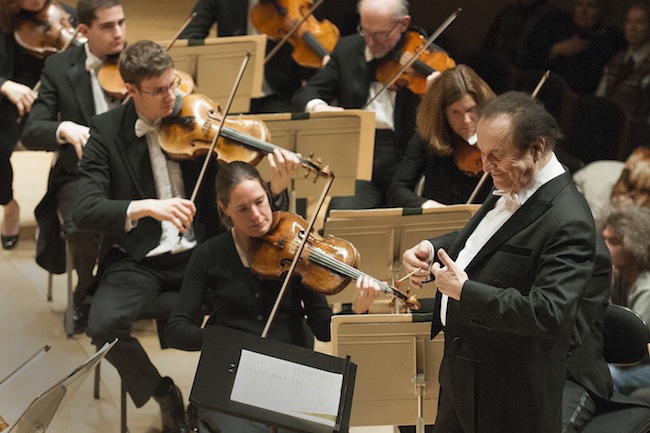Classical Concert Review: Conductor Charles Dutoit and the Boston Symphony Orchestra Perform Mozart and Mahler
Conductor Charles Dutoit seems to have little affinity for Mahler’s distinctive style. On Thursday, the quintessential Mahlerian traits – the grotesque, the naïve, the terrifying, the ironic – all sounded pretty much the same.
By Jonathan Blumhofer
The curse of conductor cancellations is a hex the Boston Symphony Orchestra (BSO) has been operating under for several years now. This season, mercifully, it didn’t strike until last week, when Daniele Gatti withdrew from his scheduled performances. But this week’s cancellation turned out to be a bit more serious: Lorin Maazel was scheduled to not only conduct the orchestra’s last three programs but also to lead it on a ten-day Asian tour next month. An injury and his doctor’s orders are keeping him grounded until the second half of May.
How happy the orchestra’s administration must be, though, that Charles Dutoit was available to step in for these concerts and the trip. He’s one of the great conductors on the scene today and his performances with the BSO over the last few years, especially, have been nothing short of revelatory.
If only this week’s program (to be repeated tomorrow night), culminating in Mahler’s Symphony no. 5, could have played more to Dutoit’s not inconsiderable strengths.
Until Thursday night, I had never heard Dutoit conduct any Mahler, either live or on disc. (A quick internet search revealed recordings of just one piece: the fourth movement of last night’s Fifth Symphony.) Now I think I know why. A master of sprawling orchestral forces he most certainly is, but Dutoit seems to have little affinity for Mahler’s distinctive style. On Thursday, the quintessential Mahlerian traits – the grotesque, the naïve, the terrifying, the ironic – all sounded pretty much the same.
This is a symphony in which, in a great performance (think Bernstein or Tilson Thomas), you can completely lose yourself. Thursday’s was far too self-conscious to achieve that ideal: if anything got lost, it was the work’s overarching sense of character and, at times, narrative.
Not that it wanted for beauty or, on occasion, excitement: the famous Adagietto floated timelessly (if a bit slowly), and the closing pages were packed with vigorous exuberance. But most of the rest of the symphony came off as a strange cross between a study in sumptuous orchestral sonorities and a kind of detached, clinical operation: to paraphrase the Discovery Ensemble’s Courtney Lewis (talking about Stravinsky) on Sunday, the effect was akin to watching something highly expressive unfold under a plate or two of glass.
Take, for instance, the symphony’s first two movements, which comprise its Part 1 (of 3). The first is a funeral march. For whom, we’re not told, but the music sets the dramatic stage for all that follows. I’ve never heard this movement played more beautifully than it was on Thursday. The performance was simply gorgeous: rich string tone; clear, focused brass; and a dazzling array of other instrumental colors (the viola/clarinet combination was particularly striking), all perfectly balanced – you could hear everything Mahler wrote, which is no small feat.
Missing, though, was any sense of loss, turmoil, or tragedy inherent to this music – the only real suggestion of melancholy came courtesy of the movement being primarily in a minor mode. It also lacked direction. Dutoit’s slow tempos let one revel in the orchestral sound, but gave this sometimes-discursive movement a rudderless, episodic feel.
The mellower parts of the second movement fared a bit better, but the “stormily agitated,” recurring opening theme – also marked in the score to be played “with the greatest vehemence” – was anything but. Flustered, perhaps, but missing was the unbridled wildness the music demands.
And so the whole reading, more or less, went. The third movement scherzo was, interpretively, perhaps the most successful, light on its feet and capturing Mahler’s mix of humor and darkness. But both it and the finale were marred by some ragged ensemble playing – the brass section seemed to be having an atypical off night – and Dutoit’s phrasing and pacing in much of the latter felt stiff, plodding, and stodgy.
In sum, this was a performance filled with lush surface details and, in the Adagietto, a gripping depth of feeling. What was absent was any consistent sense of Mahlerian soul.
The evening’s first half belonged to Mozart’s “Prague” Symphony. This is a sunny, brilliant piece that received an appropriately buoyant, jovial reading from a reduced (but still substantial) orchestral contingent: historically-informed performance practice, be damned, indeed.
Again, Dutoit’s primary focus seemed to be instrumental sonority. The bucolic bassoon tune in the first movement came through with sparkling clarity, and there was some marvelously rich and sweet wind playing in the second movement, as well. Also, in the outer movements – especially the finale – Dutoit emphasized the links between the symphonies of Mozart and those of Haydn and Beethoven, exaggerating the dynamic contrasts and keeping the energy level pulsing.
It all added up to a sprightly, satisfying performance that, in another context, might have made a greater impression. As it was, the Mozart was basically forgettable, completely overshadowed by the Mahler in the context of the evening. That it was speaks more to the worn, throwaway mentality that marked the programming on this concert than to the orchestra’s performance, which, while a little leathery (the strings were never quite together in its fast, unison passages), was marked by energy and lyricism.
The remaining two programs the BSO is taking with them to China and Japan consists of repertoire more closely associated with Dutoit – big pieces by Rachmaninoff, Tchaikovsky, and Berlioz, and concert openers by Mussorgsky and Glinka. Boston audiences can catch them all next week.
In the meantime, it will be interesting to see how Dutoit’s Mahler develops. It’s a pity it couldn’t have been traded for some Debussy or Ravel: music by either would have paired better with the Mozart and more meaningfully (and flatteringly) shown off the gifts of one of the BSO’s best and most reliable guests.
Jonathan Blumhofer is a composer and violist who has been active in the greater Boston area since 2004. His music has received numerous awards and been performed by various ensembles, including the American Composers Orchestra, Kiev Philharmonic, Camerata Chicago, Xanthos Ensemble, and Juventas New Music Group. Since receiving his doctorate from Boston University in 2010, Jon has taught at Clark University, Worcester Polytechnic Institute, and online for the University of Phoenix, in addition to writing music criticism for the Worcester Telegram & Gazette.


